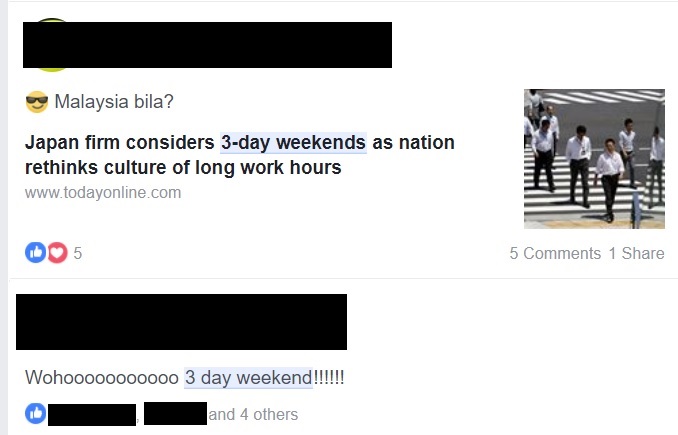What if Malaysia had long weekends every WEEK? The effect may surprise you

- 1.8KShares
- Facebook1.8K
- Twitter2
- LinkedIn8
- Email15
- WhatsApp18
(This article was originally published in Sept 2018.)
On top of national celebrations like Hari Merdeka (August 31st) and Malaysia Day (16th September), we get a lot of multi-cultural holidays for different groups of Malaysians to celebrate their special day. Sometimes, these holidays would fall right before, or after the weekend, giving everyone a long weekend!
And it makes us so sad that at the time we publish this, it would be our last long weekend of September 🙁
But have you ever imagined having 3 day weekends… forever? Come to think of it, why is there only 2 weekends in the first place anyway? And we all know weekends are actually even shorter than that, because Sunday nights are reserved for imagining the horrors we’re going to face on Monday. So it’s no surprise that when news about Uniqlo introducing a 3 day weekend policy broke, some Malaysians were quite drawn to the idea:

But its not just Japan. Across the world, companies and countries are looking more into shortening working hours, and some are taking it very seriously, as the potential benefits are greater than you would have first thought.
From reducing pollution to unemployment, Malaysia will have much to gain from 3 day weekends
Reading up on the benefits of a shorter work week, you are sure to stumble upon the name of John Maynard Keynes. He (wishfully) predicted, that sometime in 2030, people would only be working for about 15 hours a week. Keynes thought that as our productivity increased, it would in turn require us to work less.
It is reasonable to expect, let’s say a printer, to print as long as you press its button. But people are not like machines. In fact, researchers found we are quite the opposite. This study found that employees who feel cheated or used has lower productivity and work quality. Even worse, employees might feel the desire to exact revenge, which may show through behaviours like wasting office supplies and taking longer lunch breaks, or in Malaysia’s case, online shopping and scrolling Facebook.

On the other hand, feelings of freedom and empowerment not only motivates people, but also makes them more creative. As people are happier and satisfied, this can translate into saving cost in health related issues by reducing stress, as stress has been linked to increased risk of stroke, heart diseases and diabetes.
Besides boosting productivity, some experts suggest that a shorter work week could be the solution to unemployment, because by limiting the number of hours each person can work, there will be a need to employ more people. This was actually how the current 5 work day standard was introduced! Long ago, working 6 days a week was the norm, until it was adopted to solve large scale unemployment during The Great Depression in the 1930s. Ford (the car brand) was the first major employer to popularise 5 working days.
Also worth considering is the expected reduction of carbon emissions. With less people taking transport to work and staying in offices, experts believe than countries could reduce their carbon footprints significantly. The state of Utah (in America) once introduced a 3 day weekend in 2007, and tn the first 10 months, the state managed to save 1.8 million USD on their energy bill.
WOW that’s AMAZING. But here’s what we need for it to happen
Today, Netherlands has the shortest work week among any country, working around only 30 hours, while Malaysia is around 40 hours (assuming 8 hours a week for 5 days). Of course, Malaysia (and the world) can’t just abandon the 5 day week immediately. There are two major conditions that need to be fulfilled before any country can consider adopting a longer weekend.

Adopting less work days would also mean limiting the number of hours each person can work. If you’re earning below the average, being forced to work less hours isn’t really good news. To counter this problem, the wages will have to go up accordingly. A British economic think tank suggests that the government and the should share the cost of increased wages, at least until the increase in productivity matches the increase in wage.
The situation wasn’t supposed to be like this. With the advancement of technology and the increase in wealth production, the gains should have been trickled down to benefit the workers, raising their wages and shortening their work hours, at least that’s how Keynes (among others) envisioned it. Instead, it is often used to increase the profit of business owners, at the cost of the worker’s pay.
Malaysia would have a hard time catching up to this, as a report by BNM found that Malaysians are still paid significantly lower than the optimal amount to achieve a “minimum acceptable living standard”.
“In Malaysia, our salaries and wages are low, as half of the working Malaysians earn less than RM1,700 per month and the average starting salary of a diploma graduate is only about RM350 above the minimum wage.” – BNM Governor Tan Sri Muhammad Ibrahim, quoted from The Star
The second requirement is to ensure that the works hours are distributed to others, giving work opportunities to others, like what happened earlier when the 6 day work week became 5. In this regard, Malaysia’s unemployment rate still seems moderate, floating around 3.4%, compared to Thailand’s 1.2% and Philippine’s 5.7%. However, a large number of jobs created in Malaysia are being taken up by foreigners, at the expense of local graduates.

The graduate unemployment was at 4.1% in 2016, but it shot up to 10.7% in 2017 (3 times the national average).
It’s not just policies that have to change, but also the entire idea of “work”
Remember when we mentioned that Uniqlo introduced a 3 day weekend for its employees? Well, there was actually a catch in the details of the policy. In return for getting an extra weekend, workers are expected to extend their working hours (to about 10 hours) during their work days, so the work hours actually remain the same. So would a shorter work week make no difference due to the extra exertion in the end?

Perhaps the more accurate gauge would be to look at the work hours rather than the days. But at the core, the topic also brings out the question of “work”, and the purpose that it serves. We talked about how the how the increase in wealth generated weren’t distributed to the workers, but what about the type of work we do and its usefulness? American professor and activist David Graeber think that this unhealthy trend has gave birth to a lot of what he likes to call “bullsh*t jobs“.
“Technology has been marshalled, to figure out ways to make us all work more. In order to achieve this, jobs have had to be created that are, effectively, pointless. Huge swaths of people spend their entire working lives performing tasks they believe to be unnecessary. It is a scar across our collective soul. Yet virtually no one talks about it.” – David Graeber, quoted from The Guardian
In the end, a 3 day weekend isn’t just about getting an extra day off, its really about people’s social welfare and quality of life, and what is needed for the change is really more than just a declaration from the government. It’s hard to say when Malaysia, or most of the world, will finally be able to afford less work hour for people, so we’ll just leave this quote here:
“Perhaps a day might come when there would be at last be enough to go round, and when posterity could enter into the enjoyment of our labors.” – John Maynard Keynes wrote in The Economic Consequences of Peace
- 1.8KShares
- Facebook1.8K
- Twitter2
- LinkedIn8
- Email15
- WhatsApp18



